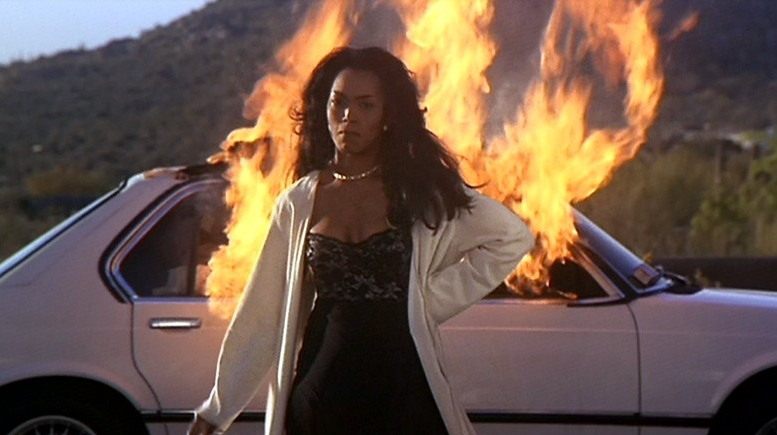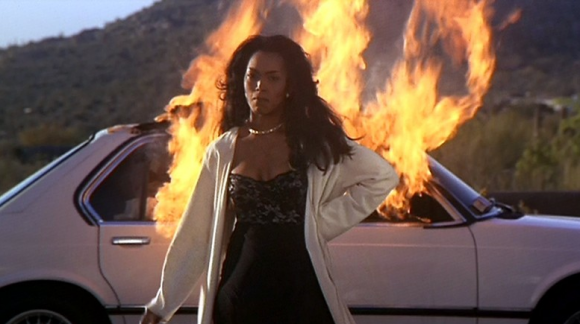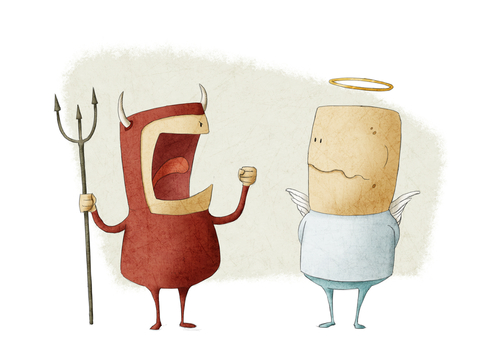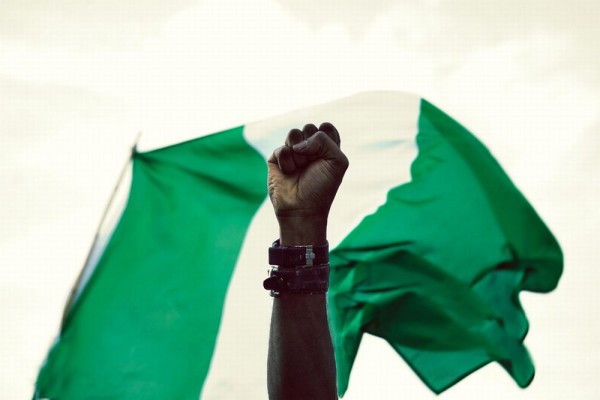A Conversation at the Airport (Which Represents 99% of the Initial Exchanges I Have with Nigerians)Â
— Begin Scene —
Me: Good Afternoon
(I hand over my passport to security check and brace myself for the interrogation that’s sure to follow…)
Officer: Mmm. (Doesn’t look up. He studies my passport seriously for a moment, then…) Where are you from?
(He can see it. It’s on my passport. But he asks anyway, because he wants us to bond over our ethnic groups.)
Me: Delta State.
Officer: Ehhh? I am also from Delta.
Me: (feigning surprise) Really? So you are my brother.
Officer: (Finally looks up, his face warmer, a small smile breaking out across his face.) Yes, my sister. You are from Agbor?
Me: Yes, my father. My mother is from Abia state.
Officer: (He lights up even more, cocks his head to the side for dramatic emphasis.) Na true? My wife is from Abia state oh.
Me: Great… (I smile politely.)
Officer: You know Abia women are very beautiful.
Me: (I laugh nervously. This is beginning to get awkward. I just want my passport back before…)
Officer: I’m from [insert name of town I don’t know, here]. You should know it. It’s not far from Agbor now.
Me: Oh okay, is it [insert name of town I don’t know, here]? By….
Officer: Just one hour, not even up to, by road.
Me: Eh, I know it now. (A lie.)
Officer: Eh hen! So you see we are relatives. Kedu? (“How are you?” in Igbo)
Me: O di mma (“Fine” Please don’t ask me to say anything else.)
Officer: (Speaking more Igbo)
Me: (I shake my head, smiling)Â My brother, I don’t understand oh.
Officer: (exaggerated look of horror)Â Ah, you no hear Igbo? How come? Your said your mother is Igbo now. Your father is from Agbor!
Me: I knooow! My parents didn’t speak the same language growing up. (A half lie – it’s proven efficient at evoking sympathy vs. a full on lecture)
Officer: Ohhhh. So you don’t speak? Not at all? (It worked. He pities me.) That is not right!
Me: (feigning disappointment) I know, I know. (Please just give me my passport so I can be on my way.)
Officer: Ah, but your parents should not have done that. (More pity.) So, okay, what about you? (Now comes the challenge: are you really Nigerian or not?)Â English is not your language now. You should have learned to speak Igbo by yourself now. Why haven’t you learnt it?
Me: (Deploy damsel in distress followed by light does of flattery) No one has taught me oohhh. I’m always asking people but nobody wants to teach me. Also, I wasn’t living in Nigeria. But now that I’m back and you are my brother, you will now teach me, abi?
Officer: Ah but of cooourse! Anytime. Because you must speak. You can’t say you are a Nigerian if you don’t speak. You should be speaking Igbo by the next time I see you. You hear?
Me: (laughing, subtly, as I gesture to my passport.) Yes, yes. I really want to learn. (That part is true, though. I want to learn Igbo, for myself, not for the benefit of appeasing cultural gatekeepers at the airport, bank, in taxis etc.)
Officer: And you must learn. Ah ah. You are a daughter of Delta State, Iboland. You must hear Igbo. This is not America. You must speak your language! Or how will you find your husband? No, you must speak Igbo, and you must teach your children to speak Igbo. (He hands back my passport, laughing).
Me: (I swallow the response I would have loved to give him for that last diatribe…) Thank you.
Officer: So when I see you next time, I will greet you in Igbo. Only in Igbo!
Me: (I go for the conversation-ender as I turn my back to him, walking away from the counter.) By God’s grace!
— End Scene –Â
For the Nigerian Who Doesn’t Speak Any Nigerian Languages, I Feel Your Pain
I’m anticipating two major responses to the scene above: 1) vigorous nodding in shared understanding about how native language fluency is policed in Nigeria (or anywhere really), or 2) *blank face* from folks who don’t get it, and agree whole-heartedly with the officer. To the latter category, this post is really for you.Â
Earlier this year, I wrote an article titled, “What Kind of African Doesn’t Speak Any African Languages? Me.“, in which I proposed people stop using indigenous language fluency as the yardstick by which to decide one’s cultural belonging, or at the very least, refrain from using it as a way to invalidate people’s identities, given that culture comprises many elements, not just language. The article was published in the Diaspora Debate section of Royal African Society’s African Arguments, news aggregator site AllAfrica.com, and ended up sparking quite a bit of online debate. Seems language as is pertains to cultural assimilation is quite the conversation starter.
I reference this article because a few points stood out to me from the conversations inspired by the piece and now, also, from having to navigate Nigeria as someone who doesn’t speak any native Nigerian languages:
- I am not alone; based on the outpour of comments that affirmed my own experiences and shared similar, there are so many people who’ve experienced social exclusion due to not being fluent in their mother tongues.
- This is not a Diaspora issue; per my article, even Africans who grew up and live on the continent aren’t learning their languages due to various factors such as globalisation, migration, and intra-country socio-political history.
- Contrary to popular assumptions, not many people actively choose not to learn their native languages; this decision is often made for them at a young age, by schools and parents, perhaps pushing for assimilation into the dominant culture in which they live, or due to other factors. (See previous point.)
- When people can choose to learn their native languages, usually in adulthood,, the tension between indigenous languages and the language of business and cultural access in an increasingly globalised world — dominated by English, French, Spanish, now Japanese and Mandarin — is in part responsible for people choosing to learn other languages over their own.
A Few Barriers Worth Noting to Learning Nigerian Languages as an Adult
Following from that last point, and in response to the skeptics who commented on my last post who insist that the only reason one does not attain language fluency in adulthood is strictly a matter of personal choice (sigh), I think it’s important we all consider the challenges to learning African languages post-childhood learning from parents/relatives at home or after one no longer lives in an environment. So, do consider the following:
1) Language Immersion Isn’t the Most Practical in Diaspora Communities
Unlike some other immigrant communities, the presence of Nigerian/Diaspora communities across the US doesn’t translate to pockets of America in which only Nigerian languages are spoken. To the best of my knowledge, our versions of say, “Chinatown” will contain everything we need – clothes, food, travel agencies, hole-in-the-wall restaurants etc, except a universally spoken Nigerian language. Why? I’m guessing it’s because we’re not a monolithic culture. Nigeria comprises well over 300 ethnic groups, and just as many languages. We wouldn’t be able to communicate across all those dialects without English. So, given that even in the most isolated of Nigerian communities outside of the country, you’ll always run into people speaking English, finding opportunities to practice a single Nigerian language using mass media (TV, Radio, even street signs), or every day communication, etc., would be challenging.
2) Language Immersion Isn’t the Most Practical in Major Nigerian Cities, Either
The best language teachers will tell you that immersion is the way to go: visit the country where the language is spoken, spend some time there, consume copious amounts of their media, make local friends, and you’ll surely pick it up. Except, part of why immersion works is that you’ve given little to no choice but to learn to communicate in the local language. The immersion strategy would work well in countries in which the local language is the language of trade, commerce, media. That is not the case in Nigeria, a former English colony, in which English is spoken in all major cities. Moving back to / living in a major city in Nigeria (after having not learned your mother tongue growing up) wouldn’t necessarily guarantee language immersion either, unless of course you quit your day job or take time off and relocate to a remote village, which brings me to the next point…
3) The Costs – In Both Time and Money – of Learning a Language Can’t Be Ignored:Â
Not everyone can afford to take time off long enough to move into a city, town, remote village for language immersion. I remember when I started schooling in the states and met Americans who understood at least one other foreign language. Most of them had learned it at school, and then spent some time (either via a study abroad program or volunteer gap year) in their specific country practicing via cultural immersion. (Oh, and by the way, it’s not like there were “Learn Igbo Abroad” programs when I was at school in the states.) This approach to learning languages can cost quite a bit of money; there’s a reason why study abroad programs and the voluntourism industry are primarily sustained by white westerners with class privilege. Nevertheless, while I was in college,  I would often have conversations with my parents about moving back home after I was done, and going to stay with my grandfather in the village for 6 months to a year, for the purpose of immersing myself in my culture and picking up the language. It seemed like a great idea, but with over 30K in student loans, day to day financial responsibilities, and of course, my own career ambitions, finding that chunk of time (and financial support) to do nothing seemed impossible, and honestly, didn’t make much sense.
4) (Good) Nigerian/African Language Learning Resources Are Few and Far Between
African countries haven’t really invested in language cultural preservation the way some other nations have. So naturally, the pool of resources for learning indigenous African languages isn’t as large as say, for Spanish. Nigerians, for instance, have rarely said to me, “Hey Spectra, if you wanna learn Igbo, go to this website.” Or “Check out this software on Amazon.com – it’s like the Rosetta Stone of African languages!” Or even, “There’s a school near you that offers Igbo and Yoruba, and I hear they’re really good.” What’s more, is that if one lives outside of Nigeria, where distribution of local media is minimal/non-existent, don’t bank on finding any children’s books or cartoons to learn the basics. (No, Barnes and Nobles doesn’t carry Nigerian children’s books. Don’t pretend to be surprised…). Mind you, it’s not because these resources don’t exist at all; in comparison to e-learning tools available for other languages, sure, African language learning e-tools and software are few and far between, but even that’s changing. So it would best serve advocates of African languages to spend less time criticising people for not learning their languages, and more time learning about which resources already exist so that they can share them.
People Like Me Want to Learn Our Languages; We Need Support, Not Criticism
And here come the look on people’s faces when I explain why I haven’t been able to learn either of my parents’ native languages till now. They’re thinking, “She’s making excuses. If she really wanted to, she would have. She just doesn’t take pride in her culture.” And I’m not being paranoid. These very words have been said to me time and time again, and especially after the post I wrote about speaking African languages. But they piss me off, not because I care so much about what people think, but because such singular opinions are riddled with uninformed assumptions that reduce such a complex issue to trivial polarities: “Who’s really African and who isn’t? Who’s really proud to be African and who isn’t?”
Rather than reduce this conversation to cliche criticise of Africans who never learned their mother tongues, wouldn’t it be more productive – and in better service of African cultural preservation — to frame our conversations about language around solutions to the diminishing fluency of African languages i.e. what we could do to increase interest AND access to learning? Not just for Africans, but for everyone?
Digital Media and Technology Could Spawn the Next Generation of African Language Resources
When I think about the popularity of the Rosetta Stone series, I can’t help but crave an entire suite dedicated to African languages. Even focusing on Nigeria alone could lead to at least four product lines, for Yoruba, Igbo, Hausa, and Fulani. But why wait for the Language Learning industry to pay attention to the demand for products that promote Nigerian/African languages? It seems Nigerians (including in the Diaspora) are taking matters into their own hands.
Incidentally, when I google “Learn Igbo Online” there are actually a surprising number of online resources, including a software coaching tool (with an accompanying manual), an e-portal for connecting with Igbo teachers, an entire site dedicated to Igbo culture, history, and language, and even a YouTube channel. I swear, none of these resources were around when I was younger, but with globalisation and the development of so many different e-learning platforms and tools, clearly, things are changing. For instance, I recently “met” (online) a young woman – Nigerian Diaspora – in the US, who’s developed an iPhone app to each toddlers Yoruba. (I’ll be publishing my interview with her early next week, so stay tuned.)
Technology alone won’t be able to solve the problem of diminishing fluency in African languages. Africans themselves must demonstrate through their actions a commitment to ensuring that our history and traditions, embedded in our indigenous languages, are safe guarded. And more importantly, our commitment to seeing this through must move beyond the admonishment of those who are not fluent, to ensuring that we support and encourage each other to strive towards Africa’s cultural preservation, together.
Have you experienced the kind of language policing I described above? People make fun of you because you don’t speak your native language? Have you yourself done the poking? I’d love to hear from you. Meanwhile, if you know any good Nigerian / African language learning resources — books, DVDs, computer software and/or digital platforms — please share them in the comments section!Â




 Really, to repeatedly “rise above” the most frustrating, painful, or otherwise emotionally debilitating situations due to racism, sexism, homophobia, other power struggles, or even our personal relationships, practically demands we deny our human instincts: to flee, to defend, to scream in the face of violence.
Really, to repeatedly “rise above” the most frustrating, painful, or otherwise emotionally debilitating situations due to racism, sexism, homophobia, other power struggles, or even our personal relationships, practically demands we deny our human instincts: to flee, to defend, to scream in the face of violence.

